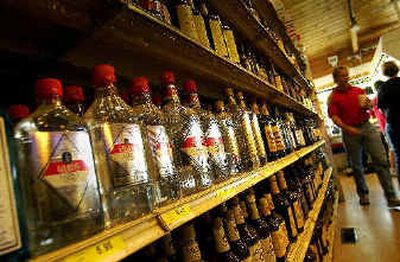Sunday liquor sales likely

BOISE – At least three North Idaho counties will decide within the next two weeks whether to allow Sunday sales of packaged liquor, under a new county-option law.
“I have not heard from a soul that’s opposed,” said Bonner County Commissioner Brian Orr.
Bonner County commissioners will vote on the Sunday sales next week, Benewah County commissioners will vote on Monday and Kootenai County commissioners are holding a public hearing and vote on July 6.
“I have no problem with it,” said Kootenai County Commissioner Gus Johnson. “You can still buy it by the drink on Sunday, but you just can’t buy it by the bottle. Some people probably wondered why you couldn’t.”
Idaho is the seventh state in the last two years to repeal a long-standing Sunday ban on sales of packaged liquor. The change, though opposed by some conservative legislators on religious grounds, won support from North Idaho lawmakers and was backed by the Idaho Association of Counties.
“We’re always very supportive of local option in any form,” said Maggie Colwell, policy analyst for the counties association. “Decisions like this that aren’t just financial, that are cultural and moral, need to be made at the local level.”
She added, “There’s of course, certain areas where they won’t even consider it, I’m sure.”
But Colwell said she’s received inquiries from counties around the state about the idea. Already, three counties have adopted resolutions to allow the sales: Valley County, which includes the resort town of McCall in central Idaho; Boise County, in the mountains northeast of Boise; and Camas County, which stretches into the Sawtooth Mountains.
Counties stand to gain directly if their liquor sales rise as a result of the change. A portion of proceeds are distributed back to counties based on sales.
Orr, former mayor of Oldtown, noted that his small Bonner County city once received just $3,500 a year in state liquor revenue, but it now gets more than $50,000. The reason: A contract liquor store opened there inside a grocery store, where previously there was no liquor store in town.
“A lot of people don’t realize the effect that alcohol sales have on local government,” Orr said.
Idaho’s new law takes effect July 1, making it the 28th state to allow packaged liquor sales on Sundays. But effective dates will vary by county, depending on when or whether each county chooses to make the change. Kootenai County’s change, for example, can’t come until after the July 6 hearing.
Initially, the change mainly will affect privately run stores that contract with the state to sell hard liquor. There are 102 of those statewide.
The 52 state-run liquor stores likely won’t change their hours unless legislators authorize additional staffers, said Ken Winkler, chief financial officer for the Idaho State Liquor Dispensary. “It’s kind of like we get an allowance from the Legislature. They appropriate so much money for us to spend, and we’re not allowed to spend any more than that, no matter how much we make,” he said.
If all 154 liquor outlets in the state were open on Sundays, the state likely would make well over a million dollars more a year in profits, Winkler said. But that doesn’t necessarily mean it would happen.
“That’s really going to be up to the Legislature,” he said. “If they choose to do that, and they choose to give us the budget to do that, then we’ll do whatever the Legislature wants us to do. Of course, if they are against it we won’t. In my opinion, we could use it, at least in a few of the metropolitan areas and in the resort areas, definitely.”
Winkler said it’s possible that one or two state stores in resort areas could open on Sundays by using funds freed up through salary savings or other methods. But, he said, “At this time we don’t have any plans to do that.”
It would take the sale of just 30 bottles of liquor to cover the costs of an extra day of staffing at a state store, Winkler said. State liquor stores sell an average of 25 bottles an hour.
Nationally, Sundays have become the second busiest shopping day of the week. Other states that recently have lifted their Sunday liquor sales bans are Oregon, Delaware, Massachusetts, New York, Pennsylvania and Rhode Island. Washington’s state liquor stores remain closed on Sundays.
Idaho’s private contract liquor stores typically also sell groceries, beer and wine, and other items, and many already are open on Sundays – they just have to close off their hard liquor sections.
“We have a lot of tourist traffic that are passing through that purchase at those contract stores,” Orr said. “It would increase the sales for the contract stores that we have, which in turn increases the amount of revenue that would come back to the cities and counties.”
Orr said he’s heard “many grumbles from people over the years” about the no-Sundays rule, which seemed to make little sense when the state allows, by county option, both packaged beer and wine sales and sales of liquor by the drink on that day.
“It’s not going to drastically increase the opportunity to have alcohol,” Orr said. “It’s just going to be a convenience for the people. … A lot of the sales that are done at these contract stores are tourist sales. They’re coming through, buying groceries. Why not allow ‘em to buy it here?”